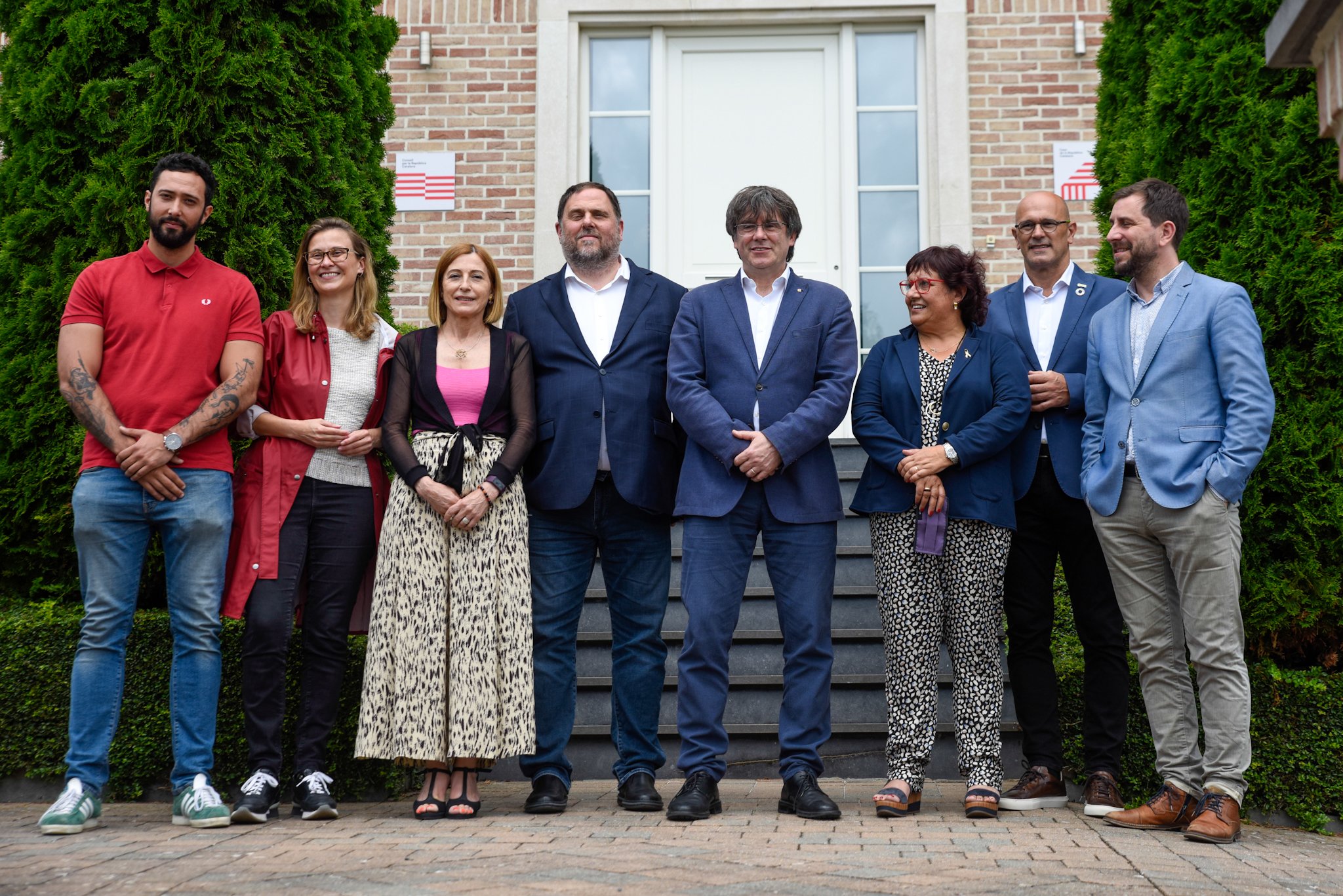Since Catalonia's fruitless declaration of independence on 27th October 2017, the two major figures behind the 1st October referendum, Carles Puigdemont and Oriol Junqueras, have not seen each other face to face. Exactly two weeks after his release through the partial pardons granted by the Spanish government, Republican Left (ERC) leader Junqueras and the other prisoners from his party, Carme Forcadell, Dolors Bassa and Raül Romeva, have today visited, together with the returned exile Meritxell Serret, Puigdemont's Casa de la República at Waterloo, Belgium, where at two o'clock this afternoon they were received by the former president, accompanied by two fellow exiles, former minister Toni Comín and the rapper Valtonyc. The reunion was long and leisurely: two and a half hours of shared meal and sobretaula - after-lunch conversation at the table. Puigdemont, whose family are cakemakers, prepared the dessert. At no time were the two party leaders expected to be alone. Nor did they make a joint press appearance.
The door was left ajar and the ERC delegation entered the house directly, without the president coming out to greet them at the entrance - which he didn't do with the Together for Catalonia (Junts) prisoners either, when they visited last week. The photo was taken moments later, when they all came out together to pose on the steps. What was not made public was the image of the precise moment of the hug between the two.

Posing on the entrance stairs: the five ERC visitors, with Puigdemont, Comín (farthest right) and rapper Valtonyc (farthest left). / M. F
The long-awaited reunion between the two key leaders of the Catalan independence parties comes almost four years after the two stood at the centre of another photograph: that taken on the grand staircase of the Catalan Parliament, moments after independence had been declared. That same afternoon in Madrid, Article 155 was activated by the Spanish Senate, imposing direct rule over Catalonia. Two days later, the president went into exile and a week later, the vice president was imprisoned. Throughout all this time, conversation has been difficult and often immersed in an excess of noise. The relationship between the two was damaged in the autumn of 2017 and the situation of repression did not help. Puigdemont himself wrote about it in his book, explaining the disagreements that took place during the peak months of the process.

The ERC prisoners in the Casa de la República with Puigdemont / M. F.
Reconciliation
Always averse to airing laundry in public, Junqueras has stated in recent hours that he does not need any reconciliation, because he has always been led by a desire for an understanding with the president. Their respective teams have placed this Wednesday's meeting in Waterloo in the context of the strictly private and personal. However, although the pair are not officially expected to address the necessary debate on the independence strategy and road map, sources on both sides admit that it will be difficult at some point not to end up on the subject, even if it is passing.
The neighbours and the curious
The expectation generated by the reunion between the two mainstays of Catalan independence drew a large media swarm, but also some independence movement supporters whose curiosity drew them to the Casa de la República. This was the case of a couple from Cerdanyola del Vallès, near Barcelona, who had been travelling through Flanders and took the opportunity to immortalize the moment. Another group, with estelada flag and "unity" banners in hand, wanted to do the same.
Meanwhile, in the house next door to the exiled president's, a neighbour hung out the Spanish flag when he saw the first cameras coming. From the balcony he watched each of the movements, as did the Belgian police, who circled repeatedly on the street out front.

Carles Puigdemont's neighbour, with Spanish flag on show. / M. F.
Measuring strategies
With ERC now in command at the Generalitat palace in Barcelona, under president Pere Aragonès, the commitment to the dialogue table with the Spanish government has become firm. The negotiating space agreed between ERC and the PSOE will be convened for only the second time in the third week of September, a few days after Catalonia's National Day, the Diada. Puigdemont's Junts party will be there as part of the coalition government with ERC, but they have dragged their feet. The Junts members have no confidence in it, they have called for plans to be made for an alternative and they have expressed their reticence about the two year margin that the third pro-independence party, the left-wing CUP, has agreed to give to the table.
For their part, ERC argue that beyond the statements made by prime minister Sánchez point-blank refusing a referendum, it is necessary to continue to work hard and leave the unilateral route in hibernation. They recall, in this regard, that for a long time the Spanish PM was also opposed to pardons - and these finally arrived.
Third journey in two weeks
Today is the third trip abroad for the pardoned ERC prisoners. The first was last week, when they went to visit the party's secretary general, Marta Rovira, in Geneva. Yesterday, Tuesday, the stop was Strasbourg, coinciding with the final plenary session of the European Parliament before the holidays. Junqueras and Romeva, both former MEPs, took the opportunity to meet members of the European Free Alliance group, to which ERC belongs. The initial idea was to take the opportunity to meet Puigdemont there, since he is an MEP. The Junts leader, however, responded that he did not plan to attend, as he was not taking part.
The pardoned prisoners from Junts also visited Puigdemont in Waterloo last week. So far, there has been no meeting bringing all of them, Junts and ERC, exiles and prisoners, together in the same spot.

Oriol Junqueras arriving at the Puigdemont residence. / ACN

